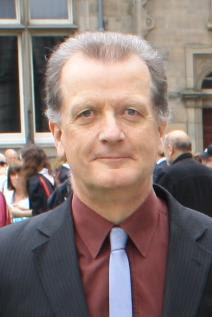 |
| Gordon Wells |
- Gordon, first of all tell please how and when did you create your community media? Was it for grant money? How many journalists/volunteers do you have?
The Island Voices/Guthan nan Eilean sites grew out of a European Union Lifelong Learning project in which the local college was involved, which started 10 years ago. It was really aimed at language learners (and teachers) to begin with, but with a strong emphasis on the Hebridean island community in which the two languages, English and Gaelic, are spoken. Gradually over time we established a multimedia online presence first through Wordpress, then YouTube (video), Ipadio (audio), and later still Facebook. There was money to support one staff member to begin with, but the ethos has been to encourage and enable community members to produce their own materials. I couldn’t count the number of individuals and community groups who have made a contribution, but it’s certainly in the hundreds.
- To be an editor of this media source is your hobby and what is your real work?
I’ve been working as a Projects Officer for the local Gaelic college, Sabhal Mòr Ostaig, for about ten years, but recently took on a new role as a Research Project Manager. This means I can no longer look after Island Voices as part of my work, so the site has to more or less look after itself now, though I’m still able to give it some time in the evenings or at weekends.
- You create videos for your website in 2 languages. Who translate
I live in a largely bilingual community where nearly everybody speaks English and a good majority also speaks Gaelic, so moving from one language to the other is not a problem for most of us. The original idea behind the project was to help people who move into the islands, either from other parts of Britain or from other countries, to learn either or both of the languages commonly spoken here, by producing short films that highlight interesting aspects of 21st Century Hebridean life, and by showing that bilingualism is a natural part of life here.
 |
| Hebridean island |
- Does your media have any investors? Did you conclude any contract with them? And how does your media exists
The project could not have started without the support of European funds and the college for which I work. It was that support that enabled me to give time to creating the first films and establishing the online platforms on which to place them. But the project now has no independent funds as such, and runs entirely on freely given time from contributors in the community.
- What is approximate amount
We’ve always used freely available platforms such as Wordpress.com, Youtube.com, Facebook.com etc
- How many news you produce per week? And how many people read/watch you?
That very much depends on the community, and what’s happening at the time. We sometimes work with other community groups on special projects like “Bonnie Prince Charlie”, or “The Great War”, when we quickly collect a whole group of recordings. At other times it’s down to individual contributions, when we might go a whole month with just a couple or three posts. We’re coming up to 150,000 YouTube hits Optimisation
- Have you ever had some problems or misunderstanding with local government/authorities?
No, not really, but our focus is much more on general lifestyle issues than on controversial political issues, local or national.
- Did somebody sue to you?
Not yet!
- Do you plan to expand your activities?
The project has really grown quite organically into
- What’s your favorite media source? And what ambitions do you have to your media in future
Due to historical failures in our education system a lot of Gaelic speakers do not, by choice, read or write the language. So the fact that it is now so easy to capture video or audio recordings of people speaking the language is a real bonus. It helps to restore the imbalance in importance
- By the way, what do you think about situation
I’m very sorry to say that I’m very ignorant about your situation. It’s very sad to hear of conflict and violence anywhere in the world. In our own very small corner we in Island Voices always tend to focus on the local interests of local people, and find plenty of positive things to say about them, whether in Gaelic or English, or even French, Russian or other languages! Perhaps local
 |
| Hebridean island looks so. Photo |
- And maybe you have some nice story how your media made somebody happier/healthier/better?
That’s a difficult choice to make. Good news
Interviews were conducted under the Project "Hyperlocal community media School", supported by the Media Development Fund of the U.S. Embassy in Ukraine. The views of the authors do not necessarily reflect the official position of the U.S. government

